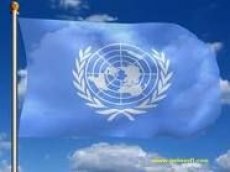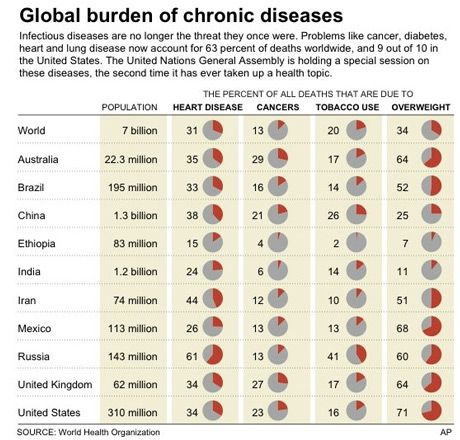New publications
The UN has compiled a new ranking of the causes of mortality of the world's population
Last reviewed: 30.06.2025

All iLive content is medically reviewed or fact checked to ensure as much factual accuracy as possible.
We have strict sourcing guidelines and only link to reputable media sites, academic research institutions and, whenever possible, medically peer reviewed studies. Note that the numbers in parentheses ([1], [2], etc.) are clickable links to these studies.
If you feel that any of our content is inaccurate, out-of-date, or otherwise questionable, please select it and press Ctrl + Enter.

For decades, global health leaders focused their efforts on infectious diseases: AIDS, tuberculosis, influenza. They pushed for vaccines, better treatments, and other ways to combat germs that could reach anywhere in the world in a matter of hours.
Now they have compiled a new list of enemies of public health. This time, it is not pathogens but our bad habits: smoking, overeating, unwillingness to exercise.
Next week, the UN General Assembly will hold its first-ever summit on chronic diseases: cancer, diabetes, heart and lung disease. They account for nearly two-thirds of deaths (about 36 million). In the United States, for example, they kill nearly nine out of 10 people.
These diseases share common risk factors, and many of them are preventable.

The spread of chronic diseases, according to the World Health Organization.
In many countries, these diseases remain... unrecognized. For example, in Ethiopia, until recently, there was only one oncologist for a population of more than 80 million. Now there are four. There are almost no medicines (or even painkillers). An outrageous case happened to a two-year-old boy, Mativos Bekele, who fell ill with leukemia. His father took him to Addis Ababa, received a consultation in the United States and prescribed chemotherapy drugs from India, but the child died because the hospital did not have a separate room to protect him from the infections that other patients were infected with. The father, who founded an organization to fight cancer, will represent a quartet of Ethiopian oncologists at the summit.
As is typical at the UN, top officials failed to agree before the meeting on what they would focus on – whether to target specific diseases or risk factors – or on targets and timelines. And with the global economy in turmoil, money is hard to come by. But Sydney Smith of the University of North Carolina, US, head of the World Heart Federation, points out that most of the proposals are worth next to nothing: “We’re not talking about trying to find the next miracle cure. We’re talking about behavioral change and cost-effective drugs like aspirin and generic blood pressure medications.”
This is only the second time the UN has turned its attention to health. The previous summit, in 2001, led to the creation of the Global Fund to Fight AIDS, Tuberculosis and Malaria, into which governments and private groups have pumped billions of dollars. But now even the richest nations are short of cash; there is little hope for private actors either. The Bill & Melinda Gates Foundation, for example, has already said it will not support the new initiative because it lacks sufficient investment in fighting infectious diseases in poor countries. The foundation believes that is now more important.
Experts disagree. “The idea that cancer is a rich country problem is a mistake,” says Eduardo Casap, president of the Union for International Cancer Control. “Most African countries are in desperate need of cancer treatment,” says Ala Alwan, deputy director general of the World Health Organization. “And the region has the highest rates of stroke and high blood pressure.”
In Ghana, there are two cancer centers “abandoned” to serve 23 million people; the country has four oncologists and no oncology nurses, says Allen Lichter, executive director of the American Society of Clinical Oncology.
Africa remains the only region in the world where infectious diseases, pregnancy complications and poor nutrition still kill more people than non-communicable diseases.
According to WHO, stroke and cardiovascular diseases account for almost half of all deaths from non-communicable diseases in the world - 17 million cases in 2008. Next come cancer (7.6 million), respiratory diseases - for example, emphysema (4.2 million), diabetes (1.3 million). It is also worth noting that most diabetics die from cardiovascular causes.
The UN decided to focus on common risk factors, i.e. tobacco use, alcohol abuse, unhealthy diet, physical inactivity and environmental carcinogens.
The impact of these factors is heterogeneous.
Europe and North America eat too much and exercise too little; heart disease and diabetes are prevalent there. Because cancer prevention and treatment have long been widely available in these regions, breast and prostate cancers, the age-related forms of the disease, are the most common cancers. In Eastern Europe and the former Soviet Union, by contrast, lung cancer dominates because of smoking. Europe is the world leader in the prevalence of this harmful habit: 29% of the population smokes, smokes, smokes.
Southeast Asia has the lowest obesity rates in the world. Yet in China, where only 6% of the population is obese, nearly 4 in 10 people have high blood pressure. And China’s respiratory mortality rate is four times higher than the U.S. rate. Many regions also have high rates of human papillomavirus infection.
In India, the government has only recently begun a major fight against diabetes and high blood pressure. The country has 51 million diabetics, the second highest rate after China. The most common form of cancer among Indians is lung cancer, and among Indian women, cervical cancer.
In Central and South America, the cancer picture largely resembles North America, with one exception: in some areas, cervical cancer dominates. The problem is specialists: in Honduras, there are only two oncologists for every 700 new cases per year.
